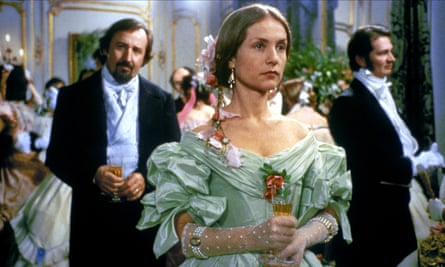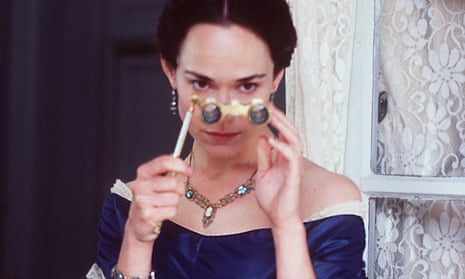Q: What does Carmela Soprano, materialistic cuckquean from The Sopranos have in common with Rory Gilmore, the precocious teenager in Gilmore Girls, and the core cast of Desperate Housewives?
A: All have been shown on screen reading Madame Bovary.
This might seem unlikely, not least because the story of a bored French housewife seduced into conspicuous consumption and extramarital affairs by unrealistic expectations of love, romance and purchasing power promulgated by popular culture would seem an ironic choice for women who epitomise precisely this ethos.
But the paradox is appropriate, for Emma Bovary is herself nothing if not paradoxical. To borrow a refrain from Sex and the City, Emma’s raison d’être is the pursuit of “labels and love”. Yet Flaubert’s early disapproval of his heroine’s self-absorption, “icy charm” and vanity is curiously transformed, in the last 100 pages or so, by a softening towards, even forgiveness of, her tawdry and narcissistic escapism. She becomes a flawed, tragic figure. Does this make Emma a pitiable prototype for the passive female gull of mass culture, operating mindlessly under “false consciousness”, or a feminist avant la lettre who subverts bourgeois morality and suffers the consequences?
Madame Bovary was a turning point in the development of the European novel; Playboy promoted a recent translation as “the most scandalous novel of all time”. Emma is a variant of the “Female Quixote”, from the title of a 1752 story by Charlotte Lennox which tells of another woman growing up isolated in the countryside and nourished on novels.
Like Austen’s Northanger Abbey, in which Catherine Morland is led astray by her avid reading of Gothic romances, Madame Bovary is full of warnings about the dangers of books, parodying critics of sentimental and sensation fiction who feared that words were capable of infiltrating the minds of impressionable (implicitly young and female) readers. No other female character, however, articulated a desire to enter the world of romantic fiction more intensely than Emma, with her infamous, rapturous exclamation – “I have a lover! A lover!” – upon consummating her first affair.
Her liaison with aristocrat Rudolphe Boulanger is no more than escapism – even the bed in which they make love is carved in the shape of boats, with curtains for sails. Later, with Léon Dupuis, Emma admires herself as “the amoureuse of all the novels, the heroine of all the plays, the vague ‘she’ of all the poetry books”. It’s only a matter of time before she discovers that “adultery could be as banal as marriage”.
The novel’s anti-romanticism is insistent and biting, as Flaubert demolishes the tired cliches in which such affairs are conducted. But if Emma is susceptible to cliches, she does not herself become one. Her condition, Flaubert makes clear, is far from unique. Emma’s disappointments stem less from innate vanity and foolishness than from the historic conditions shaping women of her day: the ascendancy of the bourgeoisie in Europe.
The new middle classes were reorienting society around a sexual dichotomy in order to reproduce themselves, which in turn engendered new hierarchies of public and private, state and family, men and women. Sex became the outer limit of democracy, as a generation of revolutionaries gave way to a triumphant and complacent petit bourgeoisie. The novel as a literary form matured alongside this increasingly prosperous class with leisure time for reading, but in the mid-19th century, the genre of realism took a scalpel to its hypocrisies, the contradictions of middle-class sexuality foremost among them.

Emma embodies those contradictions, but also seeks (albeit unsuccessfully) to overcome them. She marries the hardworking but dull country doctor Charles, of whom Flaubert observes caustically in his preparatory manuscript: “Intimate coarseness down to the way he cautiously folds his napkin, and eats his soup … In the habit of picking his teeth with the tip of his knife and trimming the stoppers of bottles to make them fit inside.”
The marriage is an escape from the peasantry into which Emma was born, and by bourgeois standards Charles is a good husband; he idolises his wife and supplies her with everything his mediocre income can provide. Emma is undoubtedly loved, but Flaubert’s point is that she nevertheless remains unhappy. She’s vain, but not quite vain enough to be content with simply absorbing Charles’s adoration. Charles Baudelaire saw Emma as the victim of “a society that has renounced spiritual love once and for all”. Stagnating in the banality of her bourgeois existence, an imaginative woman stuck in the provinces with no meaningful occupation, she asks herself: “Why – why – did I ever marry?”
Emma bequeathed a legacy of female Quixotes, afterimages of Bovarysme (a term Flaubert coined in his correspondence, though it acquired a more pathological connotation in the early 20th century). Gerty MacDowell from the Nausicaa section of James Joyce’s Ulysses (another book to fall afoul of the censor) inherits Emma’s egotistical impulses and transgressive sexual behaviour, her fantasies shaped not by chivalric romances but ladies’ magazines. The same could be said of Manuel Puig’s heroine in The Buenos Aires Affair: Gladys is an eager devotee of ladies’ journals and sentimental fiction, and also radio soap operas and Hollywood movies. Needless to say, it doesn’t end well for either of them. The similarly dissatisfied, fantasist housewife April Wheeler, of Richard Yates’s Revolutionary Road, dies in a scene of self-induced agony almost as excruciating as Emma’s suicide by arsenic, which was so excruciatingly detailed that Flaubert reputedly threw up twice while writing it.
One who makes it out alive is Clarissa Dalloway, another eponymous protagonist whose individual identity is effaced by the title. Yet ever since Woolf decided that Septimus Warren Smith had to die in order that Clarissa could live, Madame Bovary has seemed the kind of cautionary tale feminists felt the need to write against.
Erica Jong’s 15th anniversary edition of Fear of Flying attributed to the legacy of Flaubert’s novel a “considerable pressure” to kill off her adulterous heroine. But if the list of fictional women punished for desiring more than their designated lot includes Anna Karenina, Charles Dickens’s Lady Dedlock, Edith Wharton’s Lily Bart, William Thackeray’s Becky Sharp and more, Emma Bovary constitutes a real departure in the history of female adultery.
Despite constant comparisons, Emma bears little resemblance to Tolstoy’s Anna, who is castigated for marital trespass by her husband’s wrath and her own feelings of guilt. Emma is not punished by her husband, nor ostracised by the citizens of Yonville, who know of her affairs. She shows no signs of remorse – indeed, her only dread about Charles finding out that the contents of his house have been seized by the bank is that she knows he will forgive her. If this leaves the exact motives for her suicide obscure, it no doubt explains why Flaubert was taken to trial for “outrage to public morals and religion” (he was swiftly exonerated).
Henry James expressed a recurrent unease with the book: “Our complaint is that Emma Bovary, in spite of the nature of her consciousness and in spite of her reflecting so much that of her creator, is really too small an affair.” Flaubert himself professed a desire to write a novel “about nothing”. Yet today, when novels “about nothing” abound, a “small affair” seems the perfect size to skewer petit bourgeois pretensions.

Comments (…)
Sign in or create your Guardian account to join the discussion